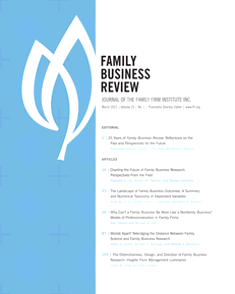Why Some Firms Internationalize Better Than Others
Editor’s note: We are pleased to welcome Chris Graves of the University of Adelaide in Australia. His paper “An Empirical Analysis of the Effect of Internationalization on the Performance of Unlisted Family and Nonfamily Firms in Australia,” co-authored by Yuan George Shan of the University of Adelaide, is forthcoming in Family Business Review and now available in the journal’s OnlineFirst section.
This FBR article was motivated by the growing body of research comparing the performance of listed family and non-family controlled firms. Coming from Australia, where the number of listed family-controlled enterprises is low (only ~17 percent of all listed firms), I was interested in ascertaining whether the performance differences between listed family and non-family controlled firms is generalisable to unlisted firms.
 Hence the first objective of this FBR article is to examine whether the performance of unlisted family firms is similar / different to that of their non-family counterparts (many of which are single owner-managed firms). Also, back in 2006, I completed my PhD titled ‘Venturing Beyond the Backyard: An Examination of the Internationalisation Process of Australian SME Family-Owned Manufacturing Enterprises’. This study highlighted that family firms lag behind their non-family counterparts when it comes to venturing overseas. Subsequent to this study, I’ve been undertaking further research on possible reasons for this, one of which is the second focus of this FBR article. Specifically, what effect does internationalisation have on the financial performance of family firms, and is this effect similar / different to that experienced by their non-family counterparts?
Hence the first objective of this FBR article is to examine whether the performance of unlisted family firms is similar / different to that of their non-family counterparts (many of which are single owner-managed firms). Also, back in 2006, I completed my PhD titled ‘Venturing Beyond the Backyard: An Examination of the Internationalisation Process of Australian SME Family-Owned Manufacturing Enterprises’. This study highlighted that family firms lag behind their non-family counterparts when it comes to venturing overseas. Subsequent to this study, I’ve been undertaking further research on possible reasons for this, one of which is the second focus of this FBR article. Specifically, what effect does internationalisation have on the financial performance of family firms, and is this effect similar / different to that experienced by their non-family counterparts?
 Interestingly, from an agency theory perspective (the dominant theory used to explain performance differences amongst listed firms), there should be little difference in performance amongst unlisted family and non-family firms, as both firms are likely to experience low levels of agency costs because of the high degree of overlap between ownership and management. Despite this, the findings reported in this FBR article highlight that family firms achieve a significantly higher Return on Assets (ROA) compared to their non-family counterparts. Further analysis revealed that this was due to the fact that family firms are able to achieve a higher profit margin, that is, keep their expenses relative to sales revenue lower compared to their non-family counterparts.
Interestingly, from an agency theory perspective (the dominant theory used to explain performance differences amongst listed firms), there should be little difference in performance amongst unlisted family and non-family firms, as both firms are likely to experience low levels of agency costs because of the high degree of overlap between ownership and management. Despite this, the findings reported in this FBR article highlight that family firms achieve a significantly higher Return on Assets (ROA) compared to their non-family counterparts. Further analysis revealed that this was due to the fact that family firms are able to achieve a higher profit margin, that is, keep their expenses relative to sales revenue lower compared to their non-family counterparts.
The other interesting finding reported in this FBR article is that family firms financially outperform their non-family counterparts when they expand internationally. Overall, growing overseas had a significant negative effect on ROA for firms in general, an issue that was not observed with family firms.
How do I see this study influencing future research and/or practice? For family business owners and advisors:
1. Although prior research suggests that family firms are less likely to venture into foreign markets (Fernández & Nieto, 2005; Graves & Thomas, 2004), based on the results in this study, there are no reasons on performance grounds why they should not be encouraged to do so.
2. Don’t underestimate the value that comes from a stewardship style of leadership. This approach to leadership may enable the firm to develop competencies not available to other firms and consequently achieve superior performance (such as lower profit margins and therefore a superior ROA). This includes building a group of talented, motivated and loyal employees who help keep costs and bureaucracy down, work together to achieve a common purpose and improve prospects for its future performance.
For future research:
1. Further research is required to examine the effect of different internationalisation strategies on the relative performance of family and non-family firms (foreign entry method employed, countries targeted).
2. Findings from this study highlight that agency theory provides little value in explaining why unlisted family firms outperform their unlisted non-family counterparts. This suggests that alternative theoretical perspectives, such as stewardship theory and / or the Resource-Based View (RBV) of the firm, may provide a better basis for explaining performance differences amongst unlisted firms.
 Read the paper, “An Empirical Analysis of the Effect of Internationalization on the Performance of Unlisted Family and Nonfamily Firms in Australia,” online in Family Business Review.
Read the paper, “An Empirical Analysis of the Effect of Internationalization on the Performance of Unlisted Family and Nonfamily Firms in Australia,” online in Family Business Review.
Dr. Chris Graves is a Senior Lecturer in Accounting and Family Business Management and co-founder of the Family Business Education and Research Group [FBERG] at the University of Adelaide Business School. His family business research focuses on firm performance, internationalisation, financing and corporate governance. Chris teaches financial management and family business management at both the undergraduate and postgraduate levels. He is currently serves on the board of the International Family Enterprise Research Academy (www.ifera.org).































































































